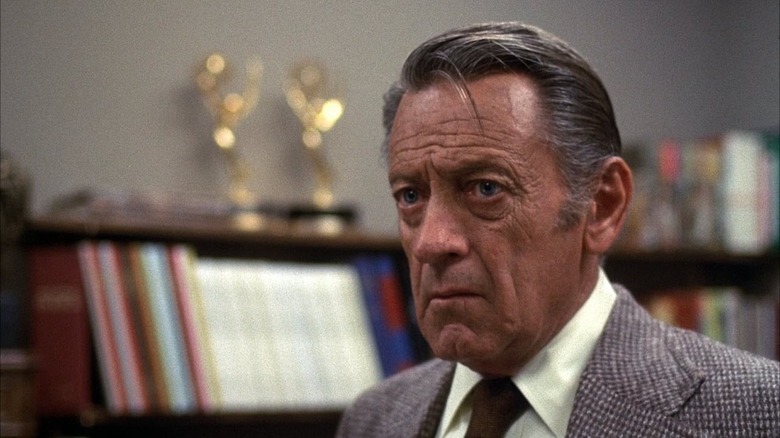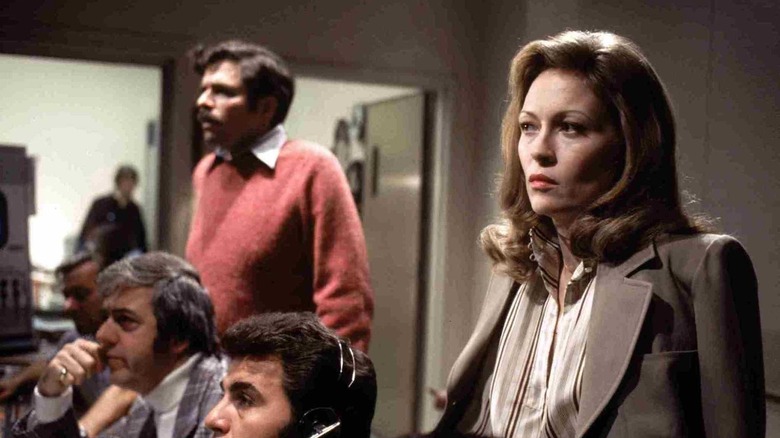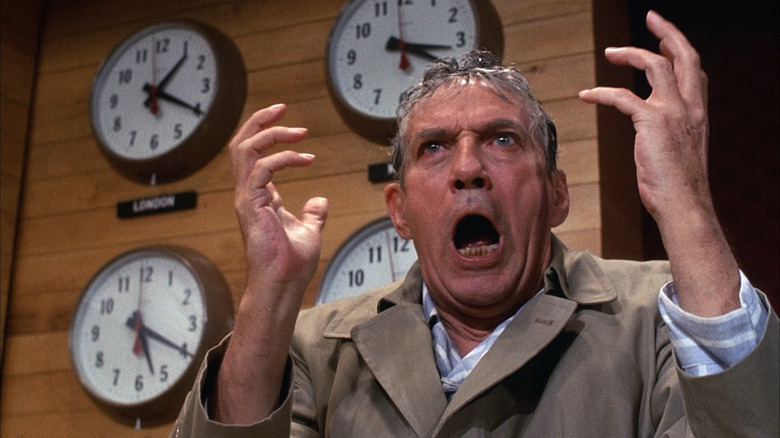Network's Dialogue Didn't Leave Any Room For Error
We may receive a commission on purchases made from links.
Sidney Lumet was born to the boards. His parents were theatrical professionals who thrust him into Broadway productions before he'd turned 10. But, as a young man, he came to love actors more than he loved acting. In his 20s, he earned acclaim as an Off-Broadway director, which drew the attention of television producers looking to bring quality theater into the homes of Americans not fortunate enough to live in New York City. He thrived, partially due to his facility with performers, but also because he wasn't an auteur eager to stamp his visual imprint on the work. He served the play because, in theater, the writer is king. And if the writer happens to be alive, he's going to wield that power.
This skill proved remarkably valuable while directing Paddy Chayefsky's 1976 masterpiece, "Network."
The screenwriter is *gasp* king?
According to Dave Itzkoff's indispensable "Mad as Hell: The Making of 'Network' and the Fateful Vision of the Angriest Man in Movies," Chayefsky was adamant that Lumet direct his witheringly satiric TV news satire. MGM/United Artists resisted at first, but ultimately caved to the Academy Award-winning screenwriter's demand. Once that hurdle was cleared, and the casting was worked out (which took more than a little doing), the studio might've thought they had a clear path to picture wrap.
But Chayefsky's contract mandated his on-set presence, and he had notes. Notes all day, every day. Most importantly, he had an exacting expectation that the actors would speak his intricately stylized dialogue as written. According to Itzkoff's meticulously researched book, whenever a line was not spoken to the word, Chayefsky ordered script supervisor Kay Chapin to set the performer straight. Chayefsky also insisted on getting close to the actors while cameras were rolling, which turned problematic when he kept maneuvering himself into the path of the key light. This obviously wrecked shots, which forced the crew to rig a less-integral light specifically for the writer. As camera operator Fred Schuler recalls, "At one point, they put a light up, a little soft light, and they called it the Paddy light. That's where his place would be."
Lumet suffered these minor indignities because, contractually, he had no choice. But, again, he knew the script was the thing. And when it came to delivering lines, Chayefsky's instincts were typically on point.
Sure thing, Mr. Beale
The centerpiece of "Network" is Peter Finch's apocalyptic "I'm as mad as hell, and I'm not going to take this anymore" speech (which, in my experience, many people quote absent an "as" and with an "it" substituted for "this," which would've cheesed Chayefsky, but good). Prior to the scene on which the entire film hinges, Finch, who's sopping wet from having walked multiple blocks in a driving rainstorm, turns up at the TV studio and shuffles past a security guard. In passing, Finch mutters, "I have to make my witness." The guard's four-word reaction, "Sure thing, Mr. Beale," was a bone of contention between Chayefsky and Lumet.
"In my heavy-handed way, Lumet said, "I told the guard to take in Peter Finch's disheveled state, then humor him as he said the line. Paddy was at my ear in a second. 'This is TV,' he whispered. 'He shouldn't even notice him.' He was right, of course. The line got the laugh it deserved. It wouldn't have been funny delivered my way."
Too many directors have way too much ego to admit when they're wrong. Lumet, having served writers from the outset of his career, knew to respect the man who put down the words. This decision served him, and the film, quite well.


